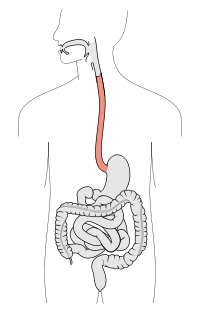
Photo from wikipedia
ABSTRACT Purpose: The aim of this study was to investigate people’s experiences of living with dysphagia after stroke, and their experiences of dysphagia management. Methods: The study design was qualitative,… Click to show full abstract
ABSTRACT Purpose: The aim of this study was to investigate people’s experiences of living with dysphagia after stroke, and their experiences of dysphagia management. Methods: The study design was qualitative, and an open-ended approach to data collection was used, with follow-up probing questions to gain more information as needed. Personal interviews were conducted with five persons who had persisting moderate to severe dysphagia after stroke, living in the south-west part of Sweden. The data were analysed with qualitative content analysis. Results: When analysing the data, the following theme emerged; “Dysphagia impacts life situations negatively and requires individually adapted, long term support from skilled health care professionals”. The theme consists of three categories: “Learning to manage dysphagia and its complications”, “Professional support with dysphagia varies” and “Finding small moments of joy despite large restrictions in life situations”. Conclusions: Findings indicated that people with dysphagia experienced a lack of support from health care professionals. Better health care support following discharge from hospital is required to ensure an optimal quality of life. Actions to achieve this may include developing national guidelines for adequate dysphagia follow-up and establishing multidisciplinary dysphagia teams in hospitals and long-term care facilities.
Journal Title: International Journal of Qualitative Studies on Health and Well-being
Year Published: 2018
Link to full text (if available)
Share on Social Media: Sign Up to like & get
recommendations!